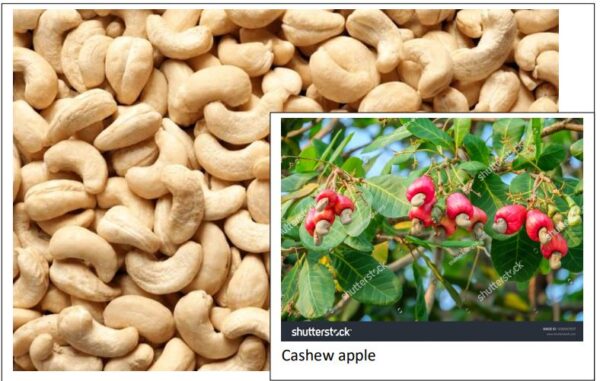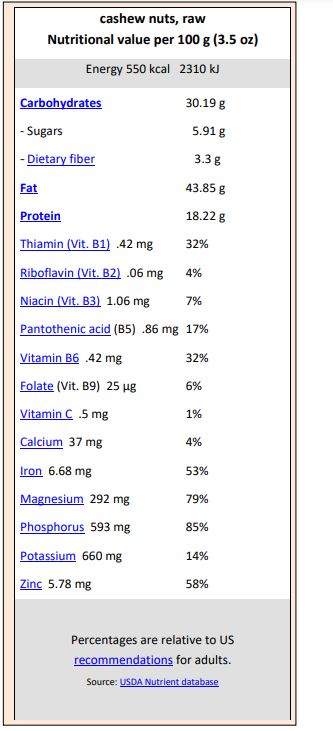Cashew nuts are a healthy snack choice due to their nutritional benefits. – By Dr. Harold Gunatillake

Image Source : alamy
Promoting cashew nuts
Sri Lanka has an advantage in promoting the health benefits of cashews, as we have a government corporation and a suitable site in Pasyala (Cadju pura). A massive billboard by the roadside at this site, before entering Pasyala, will remind motorists to stop and purchase some nuts to enjoy on the way to the hills. A giant billboard displaying “Good for your Heart” would be most appropriate.
Furthermore, good toilet facilities provided by the local Mirigama Council will encourage drivers to take a break at this spot, mainly for the comfort of the tourists, which invariably promotes adjusted sales.
Sri Lankan cashews are highly sought after for their milky flavour, and the market for Rancrisp cashews continues to grow.
The cashew, Anacardium occidentale L., belongs to the Anacardiaceae or cashew family. Two related plants in this family are the mango and pistachio trees. Cashew nuts are kidney-shaped seeds that adhere to the bottom of the cashew apple, the fruit of the cashew tree, which is native
to the coastal areas of North-Eastern Sri Lanka, Brazil, and Peru. In the 16th century, Portuguese explorers introduced cashew trees to other tropical regions such as India, Indonesia, some African countries and Sri Lanka, where they are now grown. The cashew tree was famous for its apple, which is hardly eaten in our country but is a delicacy in some countries. It is eaten ripe, mixed in fruit salads, or pickled. The trunk of the tree is also used as firewood.
Cashews are sold with the shell removed because the interior of the shell contains a caustic resin known as cashew balm. In Sri Lanka, we call it milk, and it is essential to remove this resin before the nuts are ready for consumption. The resin is poisonous and used in industries to make varnishes and insecticides. The shells are also burnt in rural homes to keep off mosquitoes, and breathing the smoke may damage the lungs in the long run.
Cashews are a nutritious food item that are packed with fibre, protein, and healthy fats. Additionally, they contain various vitamins, minerals, and beneficial plant compounds that can help protect your health. Like other nuts, cashews have the potential to promote weight loss, regulate blood sugar levels, and improve heart health. However, it’s important to note that less research is available on the specific benefits of cashews compared to other nuts. Cashew contains lower fat content.
Cashew oil contains a lower fat content than most other nuts; approximately 75% of their fat is unsaturated fatty acids, plus 75% of this unsaturated fatty acid content is oleic acid, the same heart-healthy monounsaturated fat found in olive oil. Studies show that oleic acid promotes good cardiovascular health, even in individuals with diabetes.

 Studies of diabetic patients show that monounsaturated fat when added to a low-fat diet, can help reduce high triglyceride levels.
Studies of diabetic patients show that monounsaturated fat when added to a low-fat diet, can help reduce high triglyceride levels.
Fat is carried in the bloodstream as triglycerides and settles in the body, especially under the skin and surrounding organs as triglycerides.
People with diabetes invariably have high triglyceride levels in their blood, and “statin” drugs may fail to bring them down. It stands to reason that they eat plenty of cashew nuts in their food, provided the dishes have reduced fat. As mentioned in previous articles, people with diabetes should eat plenty of big onions, crushed garlic, and cinnamon to lower their sugar levels in the blood naturally. A person with diabetes can verify this by checking the glucometer reading before eating these and two hours after. Daily exercise also brings down the sugar levels in the blood.
Increased triglyceride levels in the blood influence heart disease. They prevent the good cholesterol (HDL)
from removing the bad cholesterol (LDL) from the bloodstream. They also settle down in the body and cause weight problems. Increased weight causes inflammatory diseases like atherosclerosis, heart disease, stroke, gall bladder disease, arthritis, and many others.
Take cashew nuts to ensure you have plenty of monounsaturated fats. Cooked cashew nuts in a white curry form do not destroy the nutrient
values of the nuts. Just a quarter-cup of these delicious nuts supplies 37.4% of the daily value for mono-unsaturated fat.
Good source of nutrients In addition to the high monounsaturated fats, cashew nuts are a good source of copper, magnesium, zinc and biotin. Copper is an essential component of many enzymes and beneficial for a wide range of physiological processes, including iron absorption from the gut, elimination of free radicals, development of bone, connective tissue, and production of skin and hair pigment called melanin, hence suitable to prevent greying of hair. Copper is also a component of the enzyme superoxide dismutase, essential in energy production and antioxidant defences. Copper also helps to make the ground substance to keep the blood vessels elastic and flexible, a vital function for preventing high blood pressure, heart disease and stroke. It also helps to form the ground substance for bones and joints to keep them functionally active. In the colon, copper prevents the increase of faecal-free radical production responsible for colon cancer. “Cashew nuts have several benefits due to copper in them.”
When the copper intake is inadequate, one could develop iron deficiency anaemia, spontaneous rupture of minute blood vessels, osteoporosis in old age, joint problems like rheumatoid arthritis, brain damage, the elevation of (LDL) bad cholesterol, reduction of good cholesterol (HDL), irregular heartbeat, increased susceptibility to infections, and accelerated greying of hair.
Daily consumption of a quarter-cup of cashews will supply you with 38.0% of the daily recommended value for copper. Wearing copper bracelets and other copper ornaments also helps the absorption of copper through the skin. Magnesium in cashew nuts.
Magnesium is essential in preventing bone damage. Two-thirds of the magnesium in the human body is found in our bones. Magnesium is stored on the surface of bones for the body to draw when required.
Magnesium, by balancing calcium, helps regulate nerve and muscle tone. Magnesium is nature’s calcium channel blocker in many nerve cells, preventing calcium from rushing into the nerve cell and activating the nerve. By blocking calcium’s entry, magnesium relaxes our nerves (and blood vessels and muscles they innervate). Calcium antagonists are given to control high blood pressure and relax the heart muscles. In magnesium deficiency situations, calcium tends to gain entry, and the nerve cell can become over-activated, sending too many messages and causing excessive contraction.
Insufficient magnesium can contribute to high blood pressure and muscle spasms (including spasms of the heart muscle or the spasms of the airways, leading to asthma attacks. Magnesium deficiency may cause migraine headaches, too.
Eating an adequate quantity of cashews daily may reduce blood pressure, muscle tightness, and fatigue, prevent heart attacks, promote standard sleep patterns in women suffering from menopausal sleep disturbances, and reduce the severity of asthma. Just a quarter cup of cashews provides 22.3% of the daily value of magnesium.
“Just the Fruit for Men.”
Improved fertility is among the primary benefits of cashews for men. These nuts are rich in zinc, which boosts fertility. However, this benefit is not limited to males; it can also affect female fertility. Adding a handful of cashews to your diet can help maintain a healthy sperm count and promote fertility.
Preventing gallstones
Dietary data collected on 80,718 women from the Nurses’ Health Study showed that women who ate at least an ounce of cashew nuts, peanuts, or peanut butter each week had a 25% lower risk of developing gallstones.
Eating a handful of cashew nuts when hungry also diminishes one’s appetite, another way of controlling your body weight.
A quarter cup of raw cashew nuts contains 196.60 calories, nutrient copper 0.76 mg, magnesium 89.05 mg, tryptophan 0.07 g (also found in fresh cow’s milk – helps sleeping problems) and phosphorus 167.83 mg. Cashew provides essential fatty acids, B vitamins, fibre, protein, carbohydrates, potassium, iron and zinc.
Curing infections
Charles Weber, MS, writes that chemicals in cashew nuts, cashew apples and shell oil kill gram-positive bacteria, which cause tooth decay, acne, tuberculosis, and leprosy. He states that he made raw cashew nuts the central part of his diet for 24 hours on five occasions and eliminated an abscessed tooth all five times.
The active chemicals are anacardic acids with a 15-carbon unsaturated side chain. Dr. Weber states that the side chain with three unsaturated bonds was the most active against Streptococcus mutants. Much research is required to determine the cashew’s further antibiotic effects.
Anacardic acid has been used effectively to treat tooth abscesses due to their lethality to gram-positive bacteria.
The tree’s bark is scraped and soaked overnight or boiled as an anti- diarrheal.
As I have promoted eating “pol sambal” daily for health reasons, mixing it with crushed cashew nuts is a good delicacy. The combined taste is exquisite.
Cashew apple
This is an oval or pear-shaped accessory fruit or false fruit that develops from the receptacle of the cashew flower. Called the cashew apple, better known in Central America as “Maranon,” it ripens into a yellow or red structure about 5-11 cm long. It is edible and has a strong “sweet” smell and taste. The pulp of the cashew apple is juicy, but the skin is fragile, making it unsuitable for transport. It is used as a flavour.
Unfortunately, cashews are out of the poor man’s reach; only the rich can afford them, even in the country where they are grown.
End








